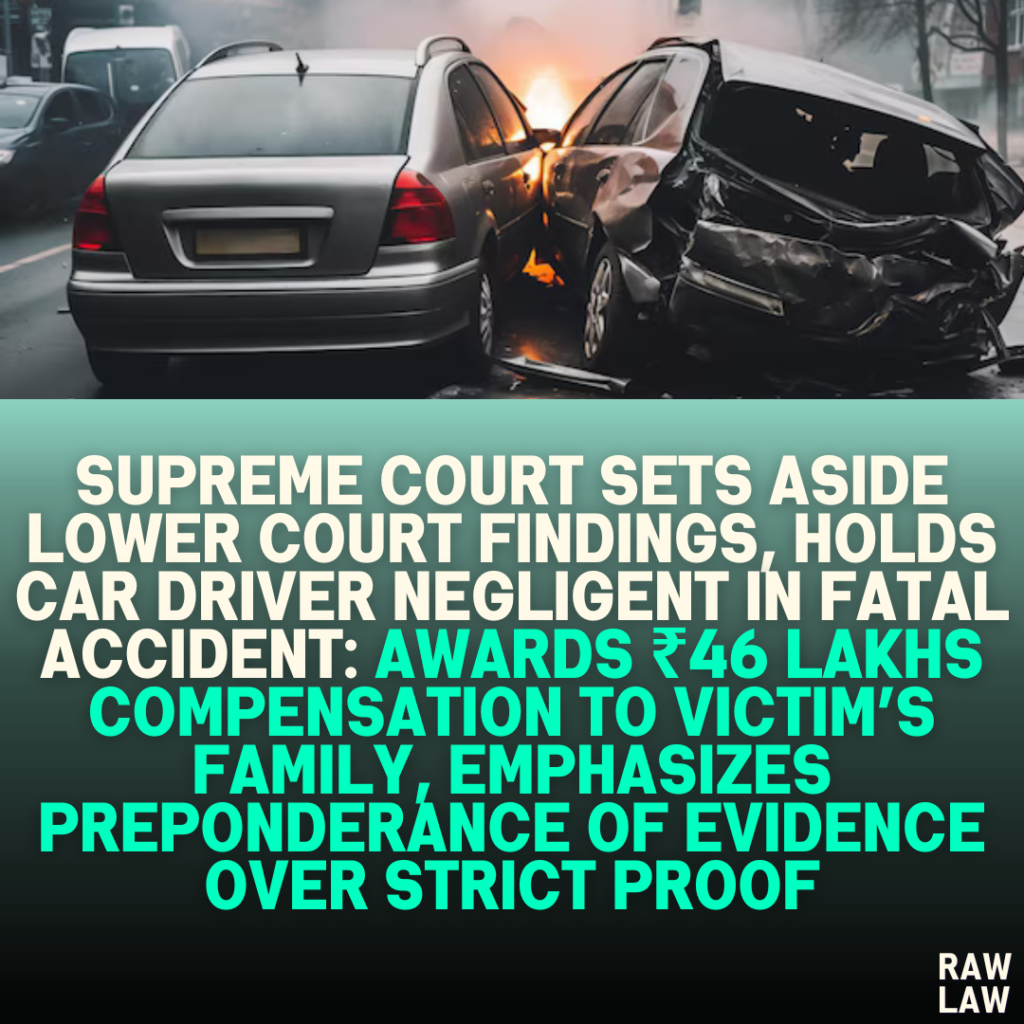Court’s Decision:
The Supreme Court overturned the decisions of the Motor Accident Claims Tribunal (MACT) and the Kerala High Court, which had dismissed the appellants’ claim for compensation. The Court held that the car involved in the accident was indeed responsible for the fatal injuries sustained by the deceased. Consequently, the Supreme Court awarded ₹46,31,496/- to the appellants with 9% interest per annum, from the date of filing until realization.
Facts:
The appellants, comprising the widow, minor child, and parents of the deceased, filed a claim following the death of the deceased, who died on 10.06.2013 in a road accident. The deceased was traveling on a motorcycle when a car, allegedly driven negligently by the respondent, struck him. The MACT dismissed the claim, concluding that the appellants failed to prove negligence on the part of the driver or the car’s involvement in the accident. This finding was upheld by the High Court, leading to the present appeal before the Supreme Court.
Issues:
- Whether the car driven by the respondent was involved in the accident leading to the death of the deceased.
- Whether the appellants were entitled to compensation due to the respondent’s negligence.
Petitioner’s Arguments:
The appellants argued that the evidence presented clearly indicated that the deceased was hit by the respondent’s car, causing fatal injuries. They submitted that both the MACT and High Court made an erroneous interpretation of the facts, ignoring the principle of res ipsa loquitur (the thing speaks for itself). They urged the Supreme Court to set aside the previous findings and award compensation.
Respondent’s Arguments:
The respondents contended that the car was not involved in the accident, and the deceased was at fault for overtaking a bus, leading to the accident. They claimed that there was no eyewitness to confirm that the car hit the motorcycle and supported the findings of the lower courts.
Analysis of the Law:
The Court noted that in motor accident claims, the principle of preponderance of probability applies, not proof beyond a reasonable doubt. It emphasized that damages to the car’s front bumper and grill, recorded in the police Mahazar, coupled with witness testimonies, strongly suggested the involvement of the car in the accident.
Precedent Analysis:
The Court referred to its previous decision in Mangla Ram v. Oriental Insurance Co. Ltd. & Ors. where it was held that in cases involving motor accidents, reappreciation of evidence is warranted if the findings of the lower courts are perverse or based on erroneous assumptions.
Court’s Reasoning:
The Supreme Court found that the lower courts had wrongly dismissed the eyewitness accounts and misinterpreted the available evidence. The damage to the car, as noted in the Mahazar, corroborated the fact that the car was involved in the accident. Additionally, the Court emphasized that motor accident claims should be decided based on the balance of probabilities, which clearly pointed to the respondent’s liability.
Conclusion:
The Supreme Court allowed the appeal, reversing the findings of the MACT and the High Court. It held that the appellants were entitled to compensation for the deceased’s death, which occurred as a result of the accident involving the respondent’s car. The Court awarded ₹46,31,496/- as compensation, with 9% interest per annum from the date of filing until realization, increasing to 12% if the payment was delayed beyond three months.
Implications:
The judgment underscores the principle that motor accident claims should be assessed on the preponderance of evidence rather than a strict requirement of proof beyond reasonable doubt. It also highlights the importance of proper consideration of material evidence, such as damage to the vehicle, in determining liability in motor accident cases.



